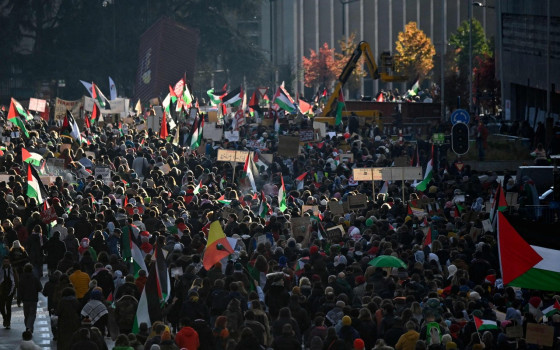
International experts warn against restrictions on those in solidarity with the victims of the conflict between Israel and Palestine

- Europe and Arabs
- Friday , 24 November 2023 13:18 PM GMT
New York - Gaza: Europe and the Arabs
Independent UN experts in the field of human rights have expressed concern about the global wave of attacks, reprisals, criminalization and sanctions against those who publicly express their solidarity with the victims of the ongoing conflict between Israel and Palestine. According to a UN news bulletin, a copy of which we received this morning. Friday
The experts said in a press statement issued Thursday, “Calls for an end to the violence and attacks in Gaza, or for a humanitarian ceasefire, or criticism of the Israeli government’s policies and actions, have been misleadingly equated in many contexts with support for terrorism or anti-Semitism.”
Experts added that this stifles freedom of expression, including artistic expression, and creates an atmosphere of fear to participate in public life.
They explained that in other contexts they had witnessed a rise in anti-Semitic rhetoric, as well as intolerance, towards those who support Israel or are perceived to support it, or who express mere sympathy for Israeli suffering in the wake of the October 7 attack.
"This does not leave much room for moderate views," they added.
Targeting artists and journalists
In their statement, the independent international experts warned that artists, academics, journalists, activists and athletes have faced particularly harsh consequences and reprisals from states and private actors, due to their prominent roles and visibility.
The experts said, "People have the right to express solidarity with the victims of gross human rights violations and to demand justice, whether from one side, the other, or both."
Experts have noted with deep concern that many artists around the world have been targeted for their artistic or political messages, pressured to change the themes of artistic expression, and labeled as either troublemakers or indifferent to the suffering of one side or the other.
They reported that some artists' programs were canceled and censored because of their calls for peace, others lost their jobs, and some artists were silenced or marginalized by their cultural organizations and artistic communities.
The experts' statement stated that journalists and media outlets in Israel and Western countries who publish reports criticizing Israeli policies and operations in the occupied territories or express pro-Palestinian opinions have been the target of threats, intimidation, discrimination and retaliation, increasing the risk of self-censorship and undermining the diversity and plurality of news that is essential to freedom of expression. Journalism and the public's right to obtain information.
Experts noted that at least one media outlet in Israel was threatened with closure due to its apparent “bias” toward Palestine. Experts criticized the disproportionate and wrongful removal of pro-Palestinian content by social media platforms.
Suspending and expelling students and academics
The experts alerted to concerns about the suspension and expulsion of students from universities, the dismissal of academics, calls for their deportation, threats to dissolve student unions and associations, and restrictions on campus meetings to express solidarity with civilians suffering in Gaza and to condemn the ongoing response of the Israeli army.
They reported that students had been blacklisted in some universities as supporters of terrorism, with accompanying threats to their future employment opportunities.
The experts also said that "some athletes, especially in Europe, have been suspended after publishing their opinions on social media, while others have been threatened with suspension from their teams, termination of their contracts, and even expulsion from their countries of residence."
They stressed that sport is about building bridges and enabling all people to meet and participate, while respecting the diversity of origins and opinions, which every human being has the right to adhere to.
Criminalizing protests
Independent human rights experts noted a very worrying trend of criminalizing pro-Palestinian protests as “hate protests” and preemptively banning them on the grounds of risks to national security, including risks related to incitement to hatred, without providing a well-founded justification. Evidence.
They added, "Such actions not only violate the right to protest guaranteed by Article 21 of the International Covenant on Civil and Political Rights, but are also harmful to democracy and any efforts to build peace."
Experts explained that any restriction of human rights must meet the conditions of legality, necessity and proportionality. They stressed that "advocating national, racial, or religious hatred that constitutes incitement to violence, hostility, or discrimination is prohibited under international law."
They called on individuals in official positions in particular to desist from hate speech and inflammatory statements.
The experts said that states have a duty to confront hate speech that dehumanizes parties to armed conflict and civilians, echoing the call of the United Nations High Commissioner for Human Rights to put an end to the rise of hate speech, anti-Semitism and Islamophobia, and to ensure the existence of a safe and enabling space to express solidarity, whether with Israelis or Palestinians.
The independent experts concluded their statement by saying, “In times of conflict and war in particular, we need to support the universality of human rights, ensure the application of the rule of law without discrimination, and carefully avoid double standards.”
It is noteworthy that special rapporteurs and independent experts are appointed by the Human Rights Council in Geneva, which is an intergovernmental body responsible for promoting and protecting human rights around the world. Rapporteurs and experts are tasked with studying human rights situations and submitting reports on them to the Human Rights Council. It should be noted that this position is honorary, and these experts are not considered employees of the United Nations and do not receive compensation for their work.












No Comments Found